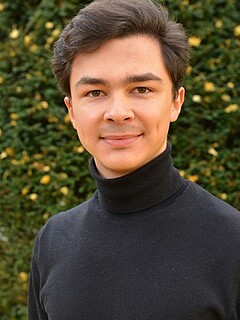PhD students 3rd cohort

Gabriel Ascanio Hecker, M.A.
gabriel.ascanio.hecker@uni-jena.de
Curriculum Vitae
2013–2016 B.A. German Studies and Theatre Studies at the Ludwig Maximilian University in Munich
2014–2019 Student tutor at the Wilhelmsgymnasium in Munich
2015 Student assistant at the “Bayerische Staatsoper 1933–1963” research project at LMU Munich
2016–2019 M.A. German Literature (focus on Modern German Literature) at LMU Munich
2016–2019 Student and research assistant of Prof. Dr. Susanne Reichlin at the Chair for Medieval German Studies at LMU Munich
2017 Two-month internship with the publishing group Droemer Knaur GmbH & Co. KG in Munich
2017–2019 Deutschlandstipendium scholarship
2019–2021 Postgraduate studies in Philosophy at LMU Munich
2021–2024 PhD student at the ‘Romanticism as a Model’ research training group at Friedrich Schiller University in Jena
2023 Three-month internship in music theatre dramaturgy at the Deutsches Nationaltheater Weimar
2024–2025 Research associate at Friedrich-Schiller-Universität Jena
PhD project
Models of Romantic Irony: German Romanticism, Nietzsche, Post-Structuralism [working title]
Irony is booming in Romanticism - and not only in the form of the rhetorical device known since antiquity and used throughout the ages, in which (to put it simply) what is said and what is meant are in opposition to each other. Rather, many Romantic authors reacted to the challenges of the dawn of modernity with a way of thinking and writing that was fundamentally characterised by a special kind of irony, so-called Romantic irony. The modernisation processes of the late 18th century in Europe, the great social, political and philosophical upheavals of the time meant the loss of traditional (supposed) certainties and brought with them a new awareness of the unfinishability of the search for meaning, the inaccessibility of the absolute and unconditional, the subjectivity and relativity of human cognition and action, etc., without the claim of constant striving and searching for the unattainable being abandoned. One way of philosophically and aesthetically dealing with this paradoxical claim typical of romanticism is Romantic irony, which - in a nutshell - can be characterised as an ambiguous image or reversible figure between articulation and simultaneous ironic withdrawal of the articulated. In contrast to everyday language irony or rhetorical irony, the articulated position here remains decidedly undecided.
The dissertation project presented here is based on the hypothesis that Romantic irony can be understood and described as a model that - even independently of direct lines of reception of Romantic texts - under changing historical conditions has repeatedly been in vogue to this day and undergone various updates, since the fundamental challenges and questions to which Romanticism reacts with this special type of irony exist until today. In the light of this assumption, texts from the work of Friedrich Nietzsche as well as from the theory and philosophy of a generously understood ‘present’, beginning with post-structuralism, will be analysed to see how the model of Romantic irony is explicitly and implicitly reflected in them, but also how ironic, self-contradictory and paradoxical structures and figures of thought in these texts differ from Romantic irony.
The basic tool of the investigation will be a general model of ironic communication, which will be developed specifically with recourse to research contributions on irony from linguistics and logic, among others, and which should be able to serve both the description of everyday ironic communication situations and the analysis of more abstract manifestations of irony in literature and philosophy. (Since irony is fundamentally a communicative phenomenon, even the most abstract manifestations of irony can be analysed as communication situations). While literary scholars often emphasise the differences between Romantic irony and everyday language irony or rhetorical irony, drawing on common but insufficient definitions of irony from rhetoric, which have been refuted and replaced in more recent linguistic works, linguists, on the other hand, usually emphasise that they are unable or unwilling to make any statements about literary or philosophical forms of irony. The dissertation project presented here, in contrast, is intended to benefit from the combination of findings from these different areas of research. The aforementioned general model of ironic communication will provide a differentiated depiction of the structures that are common to every ironic communication situation and thus make it possible to explain in a linguistically and logically sound manner in what way Romantic irony actually is irony, as well as to precisely determine the specifics of Romantic irony in differentiation from other forms of irony. Building on these findings on irony and Romantic irony, it will then be possible to work out in a differentiated way what role the latter plays in the texts analysed from Nietzsche’s work and from contemporary theory and philosophy.
Publications
- „König der Romantik“. In: Anno. Das Magazin der Medienjubiläen. Jg. 10 (2023), S. 171f. [on the occasion of Ludwig Tieck’s 250th birthday]
Presentations and Organised Events
- „Ironie im romantischen Kunstlied“ – public dialogue concert with Anna-Lena Elbert and Amadeus Wiesensee. Historische Rathausdiele Jena, 07.02.2023 [concept, organisation and moderation incl. introductory lecture]
- Premiere introduction to the production ‘I Capuleti e i Montecchi - Romeo and Juliet’ at the Deutsches Nationaltheater Weimar, 04.06.2023